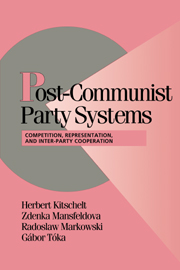Book contents
- Frontmatter
- Contents
- List of Figures and Tables
- Acknowledgments
- Introduction: Democracy and Party Competition
- Part I Theory: Party Systems and the Procedural Quality of Post-Communist Democracy
- Part II Setting and Research Strategy
- Part III The Structuring of Party Competition
- 5 Programmatic Citizen-Elite Linkage Strategies across Post-Communist Polities
- 6 Linkage Strategies within Party Systems: Diversity among Parties
- Part IV Political Alignments and Dimensions of Competition
- Part V Political Representation and the Quality of Democratic Governance
- Conclusion
- Appendix I List of Political Parties and Electoral Alliances
- Appendix II Questionnaire for the Elite Study
- Appendix III Population Survey Questions (Policy Opinions)
- Bibliography
- Index
- More Titles in the series
6 - Linkage Strategies within Party Systems: Diversity among Parties
Published online by Cambridge University Press: 05 June 2012
- Frontmatter
- Contents
- List of Figures and Tables
- Acknowledgments
- Introduction: Democracy and Party Competition
- Part I Theory: Party Systems and the Procedural Quality of Post-Communist Democracy
- Part II Setting and Research Strategy
- Part III The Structuring of Party Competition
- 5 Programmatic Citizen-Elite Linkage Strategies across Post-Communist Polities
- 6 Linkage Strategies within Party Systems: Diversity among Parties
- Part IV Political Alignments and Dimensions of Competition
- Part V Political Representation and the Quality of Democratic Governance
- Conclusion
- Appendix I List of Political Parties and Electoral Alliances
- Appendix II Questionnaire for the Elite Study
- Appendix III Population Survey Questions (Policy Opinions)
- Bibliography
- Index
- More Titles in the series
Summary
In this chapter we examine the linkage strategies of individual parties with four tasks in mind. First, we explore whether the cross-national differences in programmatic structuring observed at the level of party systems in the previous chapter are merely due to a fallacy of composition. Do our findings reflect crossnationally varying central tendencies of programmatic linkage building shared by all major parties within each polity and setting them apart from those of other polities, or do they derive from the outlier status of maverick parties? Second, we draw on our qualitative open-ended interviews in the pilot phase of our investigation as well as circumstantial evidence to explore whether parties whose programmatic crystallization is weak develop other linkage strategies, such as charismatic leadership appeals or clientelist exchange relations. Third, we examine the extent to which the basic ideological thrust of individual parties and their role in the democratic transition can explain their strategies of linkage building and programmatic competition. Maybe individual party ideology more so than communist legacies or institutional incentives influence politicians' linkage strategies. Finally, we bring the data analysis in this chapter to bear on the rival explanations of alternative linkage strategies discussed in the closing section of the previous chapter – legacies of communism, institutional equilibrium, or transitional party strategies.
PROGRAMMATIC STRUCTURING AT THE LEVEL OF INDIVIDUAL PARTIES
The big disadvantage of our party-level quantitative analysis is that the number of responses on which we base the politicians' assessment of their own party is rather small (see table 4.3).
Information
- Type
- Chapter
- Information
- Post-Communist Party SystemsCompetition, Representation, and Inter-Party Cooperation, pp. 195 - 220Publisher: Cambridge University PressPrint publication year: 1999
